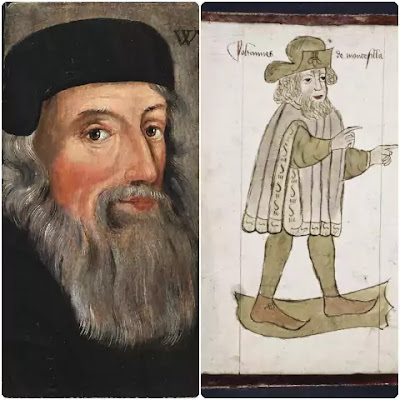Also Read
The prose of the Middle English period is very slight in bulk and has scarcely any literary value except as giving information about the state of the society and marking a stage in the evolution of English prose. English prose was nascent and was taking a form slowly in this period. English was till a neglected tongue, used only for translation. Two prose writers of the time who claim some attention are Sir John Mandeville and John Wycliffe.
 |
| Wycliffe & Mandeville |
Sir John Mandeville (1300-1372) is best known by the work Travels of Sir John Mandeville. About the authorship and authenticity of the travel there has been endless controversies. The book was originally written in French and was translated into English. It was well received in England. It is now established that Sir John Mandeville is a fictitious hero, very much like Defoe's Robinson Crusoe, the creation of the imagination of French physician named Jehan de Bourgoyne who died at Liege in 1372. He amused himself by recounting these adventures in French and passed them off as more genuine than those of Marco Polo by his realism and artlessness of description. The book pretends to be a narrative of journeys to Palestine and China by an imaginary English Knight, Sir John Mande author confesses that he travelled through strange countries where men were fed on serpents and hissed like them, of dog-headed men or of men with feet so large that they held them over their heads as sunshades. Fantasy is the soul of the narrative. Truth and fiction are strangely mingled. By its simple, effortless and almost childish style it had a happy effect on the development of English prose style.
John Wycliffe, (1320-1384) called the first Protestant, was a professor at Oxford and the chaplain to King Edward ll. He was well versed in theology and law and was drawn into the struggle that broke out in 1365, between the king and the Pope. He is strong in his denunciation of the corruptions of the church and but for strong influential patrons would have been burnt as a heretic. He wrote a large number of tracts and pamphlets in English. He was the first translator of the Bible into the English language. His translation is faulty, for his chief aim was to be literal. He abounds too much in Latin construction. His English is not polished, but vigorous and pointed, having a homely simplicity. Thus he supplied the first elements of the Biblical language which became an integral part of English prose.
Wycliffe's interests are always with the people rather than with the privileged classes. He popularised his ideas by means of the preachers who were known as Lollards. He himself translated The Gospel, and much more of The New Testament. These translations were made from the Latin Vulgate, not from the original Greek or Hebrew. Many historians admit the uncertainty of the authorship of the translation. The translation is too literal and abounds in Latin constructions.